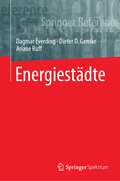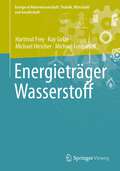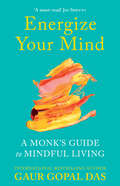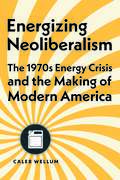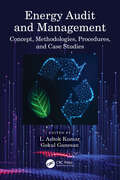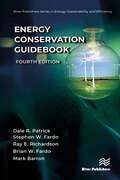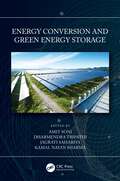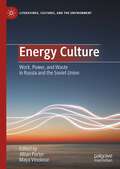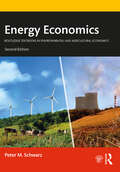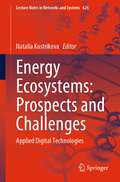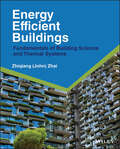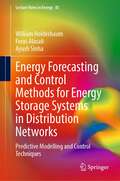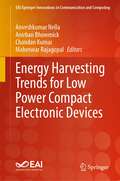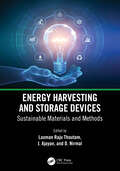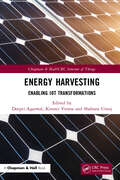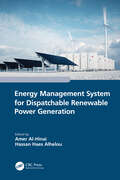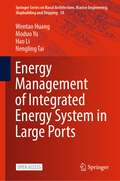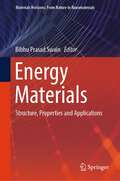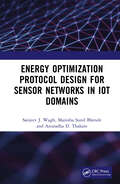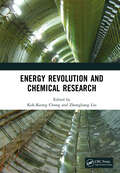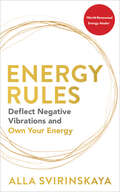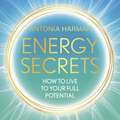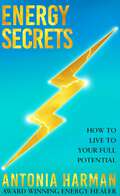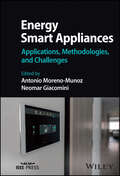- Table View
- List View
Energiestädte
by Dieter D. Genske Dagmar Everding Ariane RuffMit der Loslösung der Städte und Regionen von fossil-nuklearen Energiequellen gewinnt der energetisch-ökologische Stadtumbau zunehmend an Bedeutung. Eine wachsende Zahl von Akteuren engagiert sich für die Umstellung der Energieversorgung auf erneuerbare Energien sowie für ressourcenschonende ökologische Kreisläufe in ihrem Lebensumfeld. Der energetisch-ökologische Stadtumbau verbessert die Lebens- und Umweltverhältnisse in den Stadtteilen unmittelbar, eröffnet neue Chancen der Wertschöpfung und schafft Arbeitsplätze. Städte werden zu Energiestädten umgebaut, die den Leitmotiven der Nachhaltigkeit, der Minimierung energetisch-ökologischer Fußabdrücke und der Reduzierung des Flächenverbrauchs folgen.Das Buch entwirft Zukunftsbilder des Stadtumbaus für den Diskurs der Akteure. Es werden stadtplanerische, ingenieurtechnische und ökonomische Handlungsfelder des energetisch-ökologischen Stadtumbaus einschließlich ihrer methodischen Lösungswege disziplin-übergreifend beschrieben. Zu dieser Darstellung gehört auch die Verdeutlichung anhand einer Vielzahl interessanter Projektbeispiele.Zielgruppe dieses Buches sind insbesondere Kommunalverwaltungen und Klimaschutzmanager, Planungs- und Ingenieurbüros, Umweltorganisationen sowie Studierende und Lehrende.
Energieträger Wasserstoff (Energie in Naturwissenschaft, Technik, Wirtschaft und Gesellschaft)
by Hartmut Frey Michael Hirscher Kay Golze Michael FelderhoffIn diesem Buch sind die Besonderheiten von Wasserstoff als zukünftigen Energieträger im Rahmen der nationalen Wasserstoffstrategie Deutschland von ausgewiesenen Kennern in einer bisher ungekannte Bandbreite beleuchtet. Herstellung, die Bedeutung von Speichersystemen im Energiesystem sowie tiefgehende Details bei der Materialbetrachtung von verschiedenen Oberflächenproblemen sind ergänzt durch eine kurze Übersicht über den möglichen konkreten Einsatz von Wasserstoff. Dabei wird auf Möglichkeiten eingegangen, wie vor dem Hintergrund der globalen Klimaerwärmung der Treibhausgasausstoss praxis- und bürgernah abgesenkt werden kann.Der InhaltCharakteristika von Wasserstoff, Herstellungsverfahren, ProzesseGroßflächige nachhaltige Energieerzeugung zur Produktion des Energieträgers WasserstoffsWasserstoffspeicher und ihre AnwendungWie sicher ist die Nutzung von Wasserstoff?Speichertechnologien für WasserstoffMärkte für Wasserstoffspeicher und Bedeutung von Wasserstoff im Energiesystem und Technische Systeme für die NutzungWasserstoffnutzung in Gebäuden und kleinen SiedlungenDie ZielgruppenFachleute aus Industrie, Unternehmen und Politik, Architekten, Ingenieure, Studierende und Dozenten.Die AutorenProf. Dr. Hartmut Frey hat an der Universität Stuttgart Maschinenbau und Theoretische Physik studiert und in Plasmaphysik promoviert. Prof. Frey war Entwicklungsleiter der Leybold-Heraeus GmbH in Hanau und Köln. Er war Gastprofessor am Institut für Luftverkehr der Technischen Universität in Sofia (Bulgarien) und ist korrespondierender Professor an den Universitäten in Tomsk und Sofia.Kay Golze engagierte sich den 2010er für die Entwicklung der Elektromobilität. Im folgenden Jahrzehnt entwickelte er verschiedene Lösungen zur Anwendung von Wasserstoff im industriellem Maßstab. Als Mitglied des Wissenschaftsnetzwerk stellt er seine Analysen einer breiten Wissenschaftsgemeinde zur Verfügung, sowie anderen Wissenschaftlern und Unternehmen.Dr. Michael Hirscher ist seit 1987 wissenschaftl. Mitarbeiter am MPI für Metallforschung (jetzt Intelligente Systeme) und seit1991 Gruppenleiter "Wasserstoffspeicherung" am MPI-MF/MPI-ISDr. Michael Felderhoff ist wissenschaftlicher Mitarbeiter am Max-Planck-Institut für Kohlenforschung in Mülheim an der Ruhr. Seit 1999 befasst er sich mit der Synthese und Charakterisierung von Metallhydriden zur Speicherung von Wasserstoff und Wärme und der Umsetzung der Ergebnisse in Demonstrationsprojekte.
Energize Your Mind: A Monk's Guide to Mindful Living
by Gaur Gopal Das"This book will artfully guide you in understanding the tricks of your mind and shares powerful insights to become free from its control. It's a must-read." —Jay Shetty, #1 New York Times bestselling author of Think Like a MonkAn essential mental health and mindfulness guide with a spiritual twist written by motivational life coach and modern monk Gaur Gopal Das to learn how to regulate your own mind, emotions, and mental wellbeing.Take charge of your mind, stay in charge of your lifeIn modern times, mental health has emerged as one of the biggest challenges faced by people across the world. From loneliness to depression and the inability to work, many have questioned their deeper beliefs, were plagued by unknown fears, and struggle with existential questions.In this book, bestselling author and one of the most well-known life coaches, Gaur Gopal Das, decodes for the reader how the mind works. In his anecdotal style, he explains how to understand and then discipline our mind in such a way that it works for us and contributes to our well-being. Throughout the book, he gives exercises and worksheets, tips and tricks to help us make the change that will put us in control of our thoughts and actions.This book is an essential read for all those who want to work towards a better, more fulfilling future for themselves.
Energizing Neoliberalism: The 1970s Energy Crisis And The Making Of Modern America (Energy Humanities Ser.)
by Caleb WellumEnergy Audit and Management: Concept, Methodologies, Procedures, and Case Studies
by L. Ashok Kumar Gokul GanesanThis book describes the energy management concepts, energy audit principles, resource efficiency, and other energy conservation opportunities involved in different sectors across varied industries. Real-time case studies from various large industrial sectors, like cement, paper and pulp, refineries, manufacturing, garments and textile processing, power plants, and other MSME industrial sectors with cross functional energy conservation opportunities, are included. It also describes the future scope of energy auditing and management including IoT and data analytics. It also helps to gather the energy generated and utilization, energy conservation, and other process related data. Features: Provides entire coverage of energy management and audit concepts. Explores energy audit methodologies and energy saving initiatives. Incorporates current technologies like machine learning, IoT, data analytics in energy audit for reliability improvement. Includes case studies covering detailed energy saving calculation with investment pay back calculations. This book is aimed at researchers, professionals, and graduate students in electrical engineering, power systems, energy systems, and renewable energy.
Energy Conservation Guidebook (River Publishers Series in Energy Sustainability and Efficiency)
by Stephen W. Fardo Dale R. Patrick Ray E. Richardson Brian W. Fardo Mark BarronEfficient energy management and effective conservation procedures have been very important considerations for our society for many years. An oil embargo in the 1970s and early 1980s brought about a new awareness of energy conservation. Because of various factors like loss of tax credits and efficiency standards imposed by the government, public interest dropped considerably in regard to energy conservation. A revival in energy conservation among the general public occurred following the Persian Gulf War in the early 1990s. What does the 21st century hold? Conflicts in the Middle East, high prices for petroleum, and increasing population worldwide will all be significant influences on energy and its conservation. Considerable discussion of climate change, global warming, and increased concerns in regard to our electricity supply have provided motivation for building energy demand to be more flexible. Energy Management and Conservation, Fourth Edition, provides a very practical discussion of how energy can be managed and saved in most types of buildings. This edition not only updates the previous edition but adds updated content concerning energy cost reduction/going green to improve the environment. The authors of this book have written several books that use the systems approach. Through the use of the systems approach, the reader will be able to grasp how different parts of a building fit together to form a unit that uses energy efficiently. This text provides a thorough and practical discussion of the operation of systems that are found in most types of buildings. Each system is discussed with energy management and conservation in mind/going green to save money and improve the environment. There are many ways to manage a building to accomplish efficient energy conservation. Several of the chapters have checklists at the end to summarize ways of conserving energy that relate to the chapter. Important changes in this edition include coverage of governmental requirements from agencies such as Environmental Protection Agency (EPA), United States Department of Energy (USDOE), and American Society of Refrigerating, Heating and Air-Conditioning Engineering (ASHRAE), updated as of 2022 standards. Instrumentation updates include types of sensors and the concept of "smart" devices such as meters. Addition of computer building maintenance management systems and new updates for renewable energy resources are included. Enhancements to existing systems content (such as variable frequency drives for pumps) have been carefully added.
Energy Conversion and Green Energy Storage
by Amit SoniEnergy Conversion and Green Energy Storage presents recent developments in renewable energy conversion and green energy storage. Covering technical expansions in renewable energy and applications, energy storage, and solar photovoltaics, the book features chapters written by global experts in the field. Providing insights related to various forms of renewable energy, the book discusses developments in solar photovoltaic applications. The book also includes simulation codes and programs, such as Wien2k code, VASP code, and MATLAB®. The book serves as a useful reference for researchers, graduate students, and engineers in the field of energy.
Energy Culture: Work, Power, and Waste in Russia and the Soviet Union (Literatures, Cultures, and the Environment)
by Maya Vinokour Jillian PorterThis volume investigates energy as a shaping force in Russian and Soviet literature, visual culture, and social practice. Chronologically arranged chapters explain how nineteenth-century ideas about energy informed realist novels and paintings; how the poetics of energy defined pre-Revolutionary and Stalinist utopianism; and how fossil fuels, electricity, and nuclear fission generated distinct aesthetic features in Imperial Russian, Soviet, and post-Soviet literature, cinema, and landscape. The volume’s concentration on Russia responds to a clear need to understand the role the country plays in social, political, and economic processes endangering life on Earth today. The cultural dimension of Russia’s efforts at energy dominance deserves increased scholarly attention not only in its own right, but also because it directly affects global energy policy. As the contributors to this volume argue, the nationally inflected cultural myths that underlie human engagements with energy have been highly consequential in the Anthropocene.
Energy Economics (Routledge Textbooks in Environmental and Agricultural Economics)
by Peter M. SchwarzEnergy Economics outlines the fundamental issues and possible solutions to the challenges of energy production and use, presenting a framework for decisions based upon sound economic analysis. This approach considers market forces and policy goals, including economic prosperity, environmental protection, and societal well-being. The second edition has been thoroughly updated, addressing dramatic shifts in the use of fuel and electricity, accelerated plans for the use of renewable energy, and pathways towards a lower-carbon future. A new chapter on electric vehicles examines its impact on transportation, the electricity market, and carbon emissions. Global examples throughout the book reflect the universal application of energy economics. With this economic foundation, coupled with perspectives from real-world applications, and perspectives from related disciplines, this text sharpens the student’s ability to understand, evaluate, and critique energy policy. A companion website provides reinforcement for students through multiple choice self-test quizzes and homework exercises, as well as additional materials for instructors. This textbook should be essential reading for students of energy economics, environmental and natural resource economics, energy-related disciplines, and general readers seeking to expand their knowledge of energy economics and policy.
Energy Ecosystems: Applied Digital Technologies (Lecture Notes in Networks and Systems #626)
by Natalia KostrikovaThis book aims to review the key areas of modern research in power engineering regarding environmental conservation, as well as the research and development of digital technologies in the energy sector.The main result of fruitful work within the framework of the III International Conference "Energy Ecosystems: Prospects and Challenges: Applied Digital Technologies" has become this book, which includes 16 best reports on priority issues of modern energy development.The book is of interest to scientists, students, researchers, representatives of energy companies, representatives of leading Russian and European universities, and research institutes. We feel confident that our book will serve as an important source of information and knowledge that will lead to scientific and innovative progress in the field of sustainable development of the society.
Energy Efficient Buildings: Fundamentals of Building Science and Thermal Systems
by Zhiqiang John ZhaiEnergy Efficient Buildings A complete and authoritative discussion of the fundamentals of designing and engineering energy efficient buildings In Energy Efficient Buildings: Fundamentals of Building Science and Thermal Systems, distinguished engineer and architect Dr. John Zhai delivers a comprehensive exploration of the design and engineering fundamentals of energy efficient buildings. The book introduces the fundamental knowledge, calculations, analyses, and principles used by designers of energy efficient buildings and addresses all essential elements of the discipline. An essential guide for students studying civil, architectural, mechanical, and electrical engineering with a focus on energy, building systems, and building science, the book provides practical in-class materials, examples, and actual design practices, as well as end-of-chapter questions (with solutions) and sample group projects. Readers will find: A thorough introduction to the cross-disciplinary approach to the design of energy efficient buildings Comprehensive explorations of all critical elements of energy efficient building design, including standards and codes, psychometrics, microclimate, thermal comfort, indoor air quality, HVAC systems, and more In-depth discussions of the foundational knowledge, calculations, analysis, and principles needed to design energy efficient buildings Practical in-class examples and end-of-chapter questions with solutions for students, and design guidance and sample group projects for use in course lectures and actual design practices. Perfect for graduate and advanced undergraduate students studying building environmental systems, building systems in construction, and mechanical and electrical systems in construction, Energy Efficient Buildings: Fundamentals of Building Science and Thermal Systems will also earn a place in the libraries of practicing civil, architectural, and mechanical engineers.
Energy Forecasting and Control Methods for Energy Storage Systems in Distribution Networks: Predictive Modelling and Control Techniques (Lecture Notes in Energy Series #85)
by William Holderbaum Feras Alasali Ayush Sinha<p>This book describes the shastic and predictive control modelling of electrical systems that can meet the challenge of forecasting energy requirements under volatile conditions. The global electrical grid is expected to face significant energy and environmental challenges such as greenhouse emissions and rising energy consumption due to the electrification of heating and transport. Today, the distribution network includes energy sources with volatile demand behaviour, and intermittent renewable generation. This has made it increasingly important to understand low voltage demand behaviour and requirements for optimal energy management systems to increase energy savings, reduce peak loads, and reduce gas emissions.<p> <p>Electrical load forecasting is a key tool for understanding and anticipating the highly shastic behaviour of electricity demand, and for developing optimal energy management systems. Load forecasts, especially of the probabilistic variety, can support more informed planning and management decisions, which will be essential for future low carbon distribution networks. For storage devices, forecasts can optimise the appropriate state of control for the battery. There are limited books on load forecasts for low voltage distribution networks and even fewer demonstrations of how such forecasts can be integrated into the control of storage.<p> <p>This book presents material in load forecasting, control algorithms, and energy saving and provides practical guidance for practitioners using two real life examples: residential networks and cranes at a port terminal.<p>
Energy Harvesting Trends for Low Power Compact Electronic Devices (EAI/Springer Innovations in Communication and Computing)
by Chandan Kumar Maheswar Rajagopal Anveshkumar Nella Anirban BhowmickThis book focuses on the numerous energy harvesting techniques and their system implementation towards the fulfilment of energy requirements in compact electronic devices. These cover a wide range of applications in portable devices, bio-medical services, agriculture needs, mechanical systems, sensor networks, automobiles, food sector, home appliances, industry needs, etc. The authors detail energy harvesting methods using the latest technologies in acoustics, bio-chemical, thermal, artificial light, fluid flow, vibrations, EM energy, RF energy, piezoelectric, electrostatic, photovoltaic, thermoelectric, hybrid harvesting, ultrasonic, infrared, light, wind, and solar. The book is intended for researchers, academics, professionals, and students in energy harvesting.
Energy Harvesting and Storage Devices: Sustainable Materials and Methods
by Laxman Raju Thoutam J Ajayan D NirmalThe book discusses the materials, devices, and methodologies that can be used for energy harvesting including advanced materials, devices, and systems. It describes synthesis and fabrication details of energy storage materials. It explains use of high-energy density thin films for future power systems, flexible and biodegradable energy storage devices, fuel cells and supercapacitors, nanogenerators for self-powered systems, and innovative energy harvesting methodologies. Features: Covers all relevant topics in energy harvesting research and focuses on the current state-of-the-art techniques and materials for this application. Showcases the true potential of the nature in energy harvesting industry by discussing various harvesting mechanisms based on renewable and sustainable energy sources. Explains the recent trends in flexible and wearable energy storage devices that are currently being used in IoT-based smart devices. Overviews of the state-of-the-art research performed on design and development of energy harvesting devices. Highlights the interdisciplinary research efforts needed in energy harvesting and storage devices to transform conceptual ideas to working prototypes. This book is aimed at graduate students and researchers in emerging materials, energy engineering, including harvesting and storage.
Energy Harvesting: Enabling IoT Transformations (Chapman & Hall/CRC Internet of Things)
by Shabana Urooj Deepti Agarwal Kimmi VermaEnergy Harvesting: Enabling IoT Transformations gives insight into the emergence of energy harvesting technology and its integration with IoT-based applications. The book educates the reader on how energy is harvested from different sources, increasing the effectiveness, efficiency and lifetime of IoT devices. • Discusses the technology and practices involved in energy harvesting for biomedical, agriculture and automobile industries • Compares the performance of IoT-based devices with and without energy harvesting for different applications • Studies the challenges and issues in the implementation of EH-IoT • Includes case studies on energy-harvesting approach for solar, thermal and RF sources • Analyzes the market and business opportunities for entrepreneurs in the field of EH-IoT. This book is primarily aimed at graduates and research scholars in wireless sensor networks. Scientists and R&D workers in industry will also find this book useful.
Energy Management System for Dispatchable Renewable Power Generation
by Hassan Haes Alhelou Amer Al-HinaiEnhancing the integration of renewable power generation from wind and solar into the traditional power network requires the mitigation of the vulnerabilities affecting the grid as a result of the intermittent nature of these resources. Variability and ramp events in power output are the key challenges to the system operators due to their impact on system balancing, reserves management, scheduling, and commitment of generation units. This book presents development of energy management system for renewable power generation (EMSRPG) tool that aims to achieve power-dispatching strategies based on forecasting renewable energy resources outputs to guarantee optimal dispatch of hybrid wind-solar photovoltaic power systems (HWSPS). The key selling points of the book include the following: Renewable energy management in modern and future smart power systems Energy management systems Modeling and simulations using a real-time digital simulator (RTDS) High penetration level of renewable energy sources Case studies based on Oman’s power systems and other power grids This book discusses the challenges of integrating renewable resources, including low inertia systems, hosting capacity limitations of existing power systems, and weak grids. It further examines the detailed topologies, operation principles, recent developments in control techniques, and stability of power systems with a large scale of renewables. Finally, it presents case studies of recent projects from around the world where dispatchable power plant techniques are used to enhance power system operation.
Energy Management of Integrated Energy System in Large Ports (Springer Series on Naval Architecture, Marine Engineering, Shipbuilding and Shipping #18)
by Hao Li Wentao Huang Moduo Yu Nengling TaiThis open access book provides a detailed exploration of energy management in seaport integrated energy systems, highlighting their potential to replace conventional fuel-based energy usage and promote sustainable development of large ports. In order to achieve carbon neutrality, energy management technologies are crucial for the sustainable development of port systems that couple energies, logistics, and maritime transportation. Research on seaport integrated energy systems has attracted scholars and scientists from various disciplines, such as port electrification, logistics, microgrids, renewable energies, energy storages, and port automation. Taking a holistic approach, this book establishes a fundamental framework for the topic and discusses the electrification process, coupling mechanisms and modeling, optimal planning, low-carbon and economic operation, as well as applications of integrated energy systems in seaports. This book is intended for researchers, graduate students, and other readers interested in green seaport energy management and low-carbon operation technologies under the coupling between logistics and multi-energy systems.
Energy Materials: Structure, Properties and Applications (Materials Horizons: From Nature to Nanomaterials)
by Bibhu Prasad SwainThis book presents the latest progress in energy materials, energy storage, batteries, and supercapacitors. The contents include topics such as fundamentals of energy materials, photovoltaic materials and devices, electrochemical energy conversion and storage, and lighting and light-emitting diodes. Chapters include experimental approaches to device fabrication, photovoltaics and supercapacitors applications, etc. It also discusses energy materials' characterization, preparation methods, and performance testing techniques. The book provides ideas on the design and development of nanoscale devices and covers various applications of nanomaterials. This book is useful for researchers and professionals working in the fields of materials science.
Energy Optimization Protocol Design for Sensor Networks in IoT Domains
by Sanjeev J. Wagh Anuradha D. Thakare Manisha Sunil BhendeThis book provides an essential overview of IoT, energy-efficient topology control protocols, motivation, and challenges for topology control for Wireless Sensor Networks, and the scope of the research in the domain of IoT. Further, it discusses the different design issues of topology control and energy models for IoT applications, different types of simulators with their advantages and disadvantages. It also discusses extensive simulation results and comparative analysis for various algorithms. The key point of this book is to present a solution to minimize energy and extend the lifetime of IoT networks using optimization methods to improve the performance. Features: Describes various facets necessary for energy optimization in IoT domain. Covers all aspects to achieve energy optimization using latest technologies and algorithms, in wireless sensor networks. Presents various IoT and Topology Control Methods and protocols, various network models, and model simulation using MATLAB®. Reviews methods and results of optimization with Simulation Hardware architecture leading to prolonged life of IoT networks. First time introduces bio-inspired algorithms in the IoT domain for performance optimization This book aims at Graduate Students, Researchers in Information Technology, Computer Science and Engineering, Electronics and Communication Engineering.
Energy Revolution and Chemical Research: Proceedings of the 8th International Conference on Energy Science and Chemical Engineering (ICESCE 2022), Zhangjiajie, China, 22–24 April 2022
by Kok-Keong Chong Zhongliang LiuThe primary goal of the book is to promote research and developmental activities in energy, power technology and chemical technology. Besides, it aims to promote scientific information interchange between scholars from top universities, business associations, research centers and high-tech enterprises working all around the world. The conference conducted in-depth exchanges and discussions on relevant topics such as energy engineering and chemical engineering, aiming to provide an academic and technical communication platform for scholars and engineers engaged in scientific research and engineering practice in the field of energy materials, energy equipment and electrochemistry. By sharing the research status of scientific research achievements and cutting-edge technologies, it helps scholars and engineers all over the world comprehend the academic development trends and broaden research ideas. So as to strengthen international academic research, academic topics exchange and discussion, and promote the industrialization cooperation of academic achievements.
Energy Rules: Deflect Negative Vibrations and Own Your Energy
by Alla SvirinskayaA unique toolbox-in-a-book that could change your energy levels and your life, from disruptor, visionary, and world-renowned wellness expert Alla Svirinskaya.In this trailblazing book, Alla uncovers the hidden reason behind our energy and power loss – our innate tendency to synchronize with others, which brings positives such as infectious laughter and enthusiasm, but also negatives in the form of exhaustion from &‘catching&’ negative vibes.Energy knowledge brings energy power, and with the guidance of Energy Rules you will filter out what harms and attract what uplifts. Our energy is a precious part of our identity, as unique as our fingerprint, and we all possess a distinct &‘energy ID&’. In this highly practical book, you&’ll learn how to unlock yours and use it to navigate your life. Hailed as a &‘super guru&’, Alla demystifies commonly misunderstood terms, like &‘toxic energy&’, &‘energy hygiene&’ and &‘energy vampire&’ so you can transform the fear of negativity into your authentic superpower.This practical and pro-inclusion guide is an ideal companion and catalyst to any modality of therapy and self-care routine you might be undertaking. Alla's results-oriented approach won her universal praise, and in this book full of easily applied expert know-how, you&’ll discover how to:live a &‘non-toxic energy&’ lifestyle for thriving in the modern world sustain your spiritual wellbeing throughout your daily lifeself-scan your energy for blockages and life-force losssupercharge your aura immunity for energy self-defencerecognize different types of energy vampires and create tailored protectionapply Alla&’s practice-proven quick-shift energy techniques for immediate self-regulationunlock your &‘energy ID&’ and become your authentic selfapply &‘energy hygiene&’ to purify your energy environment and clean your inner magnet for attracting intentionsuse Alla&’s &‘aura probiotics&’ formula to enable positive energy not only to be attracted to you, but also thrive within youshare easy energy rules with family and friends to improve the energy environment in the worldminimize &‘digital pollution&’ and embrace digital living on human termsmend energy leaks to upsurge your life forceupgrade your self-care routine with secrets for personal energy managementsupercharge your manifestation abilitiesheal with a pioneering sense-hacking &‘Energyceutical&’ Power MeditationEnergy might rule, but you hold the reins with Energy Rules!For decades, bestselling author Alla Svirinskaya has made headlines around the world with her extraordinary healing power. Now, with her highly acclaimed Energy Rules, you can hold the power to your energy makeover and wellbeing breakthrough. Sounds too good? This book will feel even better – start playing by the new rules today and feel the difference!This book was previously published as Own Your Energy.
Energy Secrets: How to Live to Your Full Potential
by Antonia HarmanHarness your energy and unlock your full potential to live a harmonious life.Energy Secrets is the essential guide for anyone wanting to become the master of their own energy. Multi-award-winning healer and teacher Antonia Harman will show you how to transform your energy and thrive. From finding therapy in nature, mastering manifestation and avoiding the dark side, to why there is more to life than chakras, this audiobook will provide you with a toolkit to raise your vibration and help you feel more empowered in your life.With exclusive insights into new cutting-edge energy work, Harvard studies in happiness and energy, Energy Secrets will empower you on your journey to understanding your energy field and will equip you with a plethora of action points to implement with life changing outcomes.(P) 2023 Hodder & Stoughton Limited
Energy Secrets: How to Live to Your Full Potential
by Antonia HarmanBecome the master of your own energy with this essential guide packed with tips, techniques, insights and advice to help raise your vibration, transform your life and thrive!Drawing on ancient wisdom, evidence based-information and Antonia's personal ground-breaking discoveries, you can learn how to master your energy, and the energy around you, and see results. From manifesting, setting clear personal boundaries, learning how to draw energy in nature, cold water therapy and the power-boosting effects of tapping - plus so much more.This practical toolkit is vital for anyone living in the busy modern world and will help you optimise your mental and spiritual health, leaving you feeling happier, stronger and spiritually grounded.
Energy Secrets: How to Live to Your Full Potential
by Antonia HarmanBecome the master of your own energy with this essential guide packed with tips, techniques, insights and advice to help raise your vibration, transform your life and thrive!Drawing on ancient wisdom, evidence based-information and Antonia's personal ground-breaking discoveries, you can learn how to master your energy, and the energy around you, and see results. From manifesting, setting clear personal boundaries, learning how to draw energy in nature, cold water therapy and the power-boosting effects of tapping - plus so much more.This practical toolkit is vital for anyone living in the busy modern world and will help you optimise your mental and spiritual health, leaving you feeling happier, stronger and spiritually grounded.
Energy Smart Appliances: Applications, Methodologies, and Challenges
by Antonio Moreno-Munoz Neomar GiacominiEnergy Smart Appliances Enables designers and manufacturers to manage real-world energy performance and expectations by covering a range of potential scenarios and challenges Energy Smart Appliances provides utilities and appliance manufacturers, and designers with new approaches to better understand real-world performance, assess actual energy benefits, and tailor each technology to the needs of their customers. With contributions from a fully international group of experts, including heads of prestigious research organizations and leading universities, and innovation managers of the main appliance manufacturers, Energy Smart Appliances includes discussion on: Enabling technologies for energy smart appliances, covering IoT devices and technology and active energy efficiency measures in residential environments Smart home and appliances, answering questions like ‘Where are we heading in terms of the overall smart homes’ future?’ and ‘What’s the energy impact from smart home devices?’ Demand-side management and demand response, covering overall system/ appliances readiness and ideal energy management scenario to drive demand response Energy smart appliances’ best practices and success stories, including refrigerators, washers, dryers, and more With practical coverage of a wide range of potential scenarios and existing and future challenges, Energy Smart Appliances is an essential learning resource for electrical engineering professionals, equipment manufacturers, and designers, along with postgraduate electrical engineering students and researchers in related fields and programs of study.
